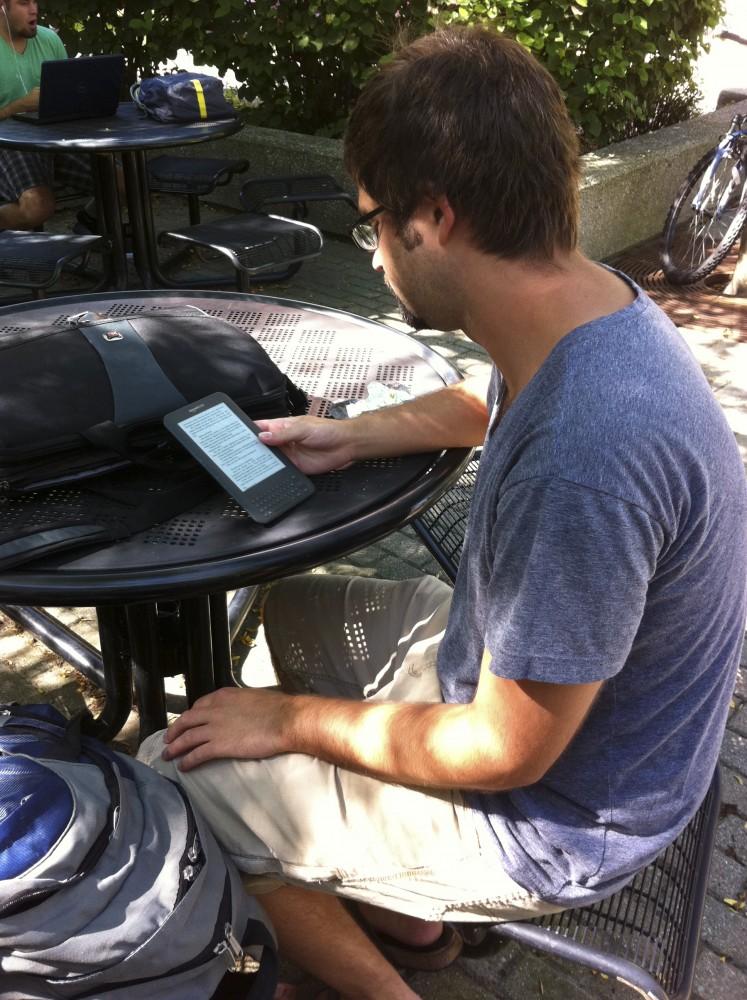Students on campus hitting the books … online?

GVL/ Rane Martin Junior Mitchel Spleet reads an e-book on his Kindle between classes.
Sep 1, 2011
With classes in full swing, students at Grand Valley State University are crunching numbers when it comes to buying books this fall and pursing their options.
E-books are an option, sold at both the University Bookstore and Brian’s Books, but at both locations’ store officials say numbers are not growing. In fact, Tony Glaab, textbook manager from UBS, said books sales are doing the exact opposite.
“I don’t have any numbers for this semesters’ (sales) yet, but last year we actually sold half as many textbooks as we did the prior year,” Glaab said.
He said the store’s most popular e-book title is a BIO 120 book, and out 571 total books sold, only 27 – about 5 percent – were e-books.
“That’s by far my best selling book,” he said. “We usually only sell 2 to 3 in other classes.”
E-books are even less popular at Brian’s Books, where storeowner Brian Page said there is very little demand for e-book versions of text.
“We have a very small select number of e-books, but what we have found is that people really don’t want them,” he said.
Both Page and Glaab say many students they talk to prefer the hardcopy.
“One student explained it the best to me,” Glaab said. “He said, we spend so much of our time online researching – I mean, how much of your time do you spend online socially with Facebook and other venues – he said the last thing he wants to do is read his textbook online.’”
And as a former teacher, Page believes in books – the printed kind.
“I have not seen one research project that demonstrates that e-books are better or even the same as the printed book,” Page said. “In other words, when people study – and this is not a learned thing, I think this is a physiological thing – people retain info better off a printed page than they do off of a screen.”
Learning retention aside, Glaab and Page both said for those looking to seek an immediate price reduction, e-books can be a good option. In the long-term, however, buying your book and selling them back at the end of the semester will result in more total savings.
“Some people simply shop price point, that’s it, that’s the single most important thing,” Page said. “And that’s why rental is getting popular, and that’s why e-books are finding a niche in the market, because they are cheaper. But more kids are taking the long-term approach, when they say ‘it’s going to cost more now, but I’ll recoup that during buy backs.’”
For students who want to save without going online, Brian’s Books is offering rentals, which have been growing steadily in popularity. But Page said it’s the same savings policy as e-books – you’re spending less upfront, but you’re not recouping as large of savings later.
“It’s cheaper up front for the kids to get it, but the bad news is, if you rent something, there’s no buy back,” he said. “So if it’s a book that’s going to be used over and over and over again you actually pay more to use it than if you bought it new or used.”
Glaab said instead of renting, UBS has turned to a ‘buy back guarantee’ that students can find on backer on selected books off the shelf cart.
“It takes some of the guess work out of it and every time it’s going to a better deal than renting the book,” Glaab said.























